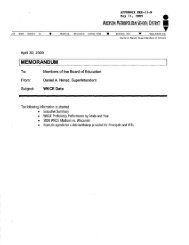interpretations of standards-based grading and reporting - School ...
interpretations of standards-based grading and reporting - School ...
interpretations of standards-based grading and reporting - School ...
Create successful ePaper yourself
Turn your PDF publications into a flip-book with our unique Google optimized e-Paper software.
Sara Hagen<br />
Chapter 4: Practical Obstacles to Learning a New<br />
Language<br />
Learning the language <strong>and</strong> developing a culture <strong>of</strong> <strong>st<strong>and</strong>ards</strong>-<strong>based</strong> education<br />
requires both time <strong>and</strong> access to the proper tools. Furthermore, like any group <strong>of</strong><br />
language learners, teachers are not a homogeneous group <strong>of</strong>leamers, <strong>and</strong> they need<br />
varying levels <strong>of</strong> support, resources <strong>and</strong> time in order to make the transition to <strong>st<strong>and</strong>ards</strong><strong>based</strong><br />
<strong>grading</strong>.<br />
Time [page 95]<br />
Teachers need time to underst<strong>and</strong> <strong>st<strong>and</strong>ards</strong> <strong>and</strong> power <strong>st<strong>and</strong>ards</strong>, to align<br />
curricula <strong>and</strong> assessments with <strong>st<strong>and</strong>ards</strong>, to develop criteria for assessments, <strong>and</strong> to<br />
create <strong>and</strong> master new record-keeping systems. Teachers reported an overall increase in<br />
their workload. "Time" was the fourth most common word in teacher comments on the<br />
survey, appearing fifty-four times on twenty-eight surveys. St<strong>and</strong>ards-<strong>based</strong> <strong>grading</strong><br />
requires additional time in planning stages early in a unit <strong>and</strong> additional time at the end <strong>of</strong><br />
the quarter when recording grades. Ideally, time for collaboration <strong>and</strong> individual work<br />
would be scheduled within the st<strong>and</strong>ard school day.<br />
Teachers <strong>of</strong> multiple subjects need additional time <strong>and</strong> support for this change.<br />
Overall, teacher familiarity with <strong>st<strong>and</strong>ards</strong>-<strong>based</strong> <strong>grading</strong> increased from August to<br />
December [page 98]. Teachers <strong>of</strong> three or more subjects rated themselves significantly<br />
less familiar, <strong>and</strong> they also rated creation <strong>of</strong> subject-specific rubrics as a much higher<br />
pr<strong>of</strong>essional development priority than did other teachers [page 98].<br />
Some teachers viewed <strong>st<strong>and</strong>ards</strong>-<strong>based</strong> <strong>grading</strong> as a distraction from other<br />
important goals, including planning good lessons, finding resources, differentiation, <strong>and</strong><br />
communicating with parents. This apparent conflict <strong>of</strong> interests could be deemphasized<br />
through increased attention to the ways that <strong>st<strong>and</strong>ards</strong>-<strong>based</strong> <strong>grading</strong> is related to <strong>and</strong><br />
should support teachers' other goals. Without the larger vision <strong>of</strong> <strong>st<strong>and</strong>ards</strong>-<strong>based</strong><br />
education, teachers resent the technical difficulties <strong>and</strong> are unable to see why it could be<br />
worth their effort.<br />
Tools for <strong>st<strong>and</strong>ards</strong>-<strong>based</strong> <strong>grading</strong> [page 100]<br />
Two important tools for the implementation <strong>of</strong> <strong>st<strong>and</strong>ards</strong>-<strong>based</strong> <strong>grading</strong> are<br />
rubrics <strong>and</strong> grade book s<strong>of</strong>tware. The two main purposes <strong>of</strong> <strong>st<strong>and</strong>ards</strong>-<strong>based</strong> <strong>grading</strong> are<br />
to improve accountability <strong>and</strong> to improve learning. These purposes create conflicts when<br />
teachers choose which tools to use. Holistic rubrics serve accountability purposes well<br />
<strong>and</strong> are best for summative assessments; analytic rubrics are better for daily classroom<br />
instruction <strong>and</strong> formative use.<br />
Likewise, the district's current grade book s<strong>of</strong>tware provides information about<br />
students' progress to administrators for accountability purposes; however, it is not<br />
optimized for providing formative information to teachers or parents <strong>and</strong> students [page<br />
102]. I summarize teachers' comments about related to implementation <strong>of</strong>Ie grade book<br />
for <strong>st<strong>and</strong>ards</strong>-<strong>based</strong> grade <strong>reporting</strong>. In general, several teachers reported that the<br />
program is neither logical nor user-friendly. Major areas <strong>of</strong> concern include the data<br />
entry process, the visual interface, calculation <strong>of</strong> grades, <strong>and</strong> communication with<br />
Page 11



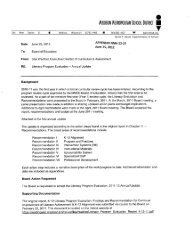
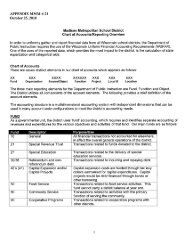
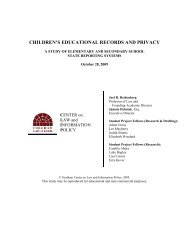
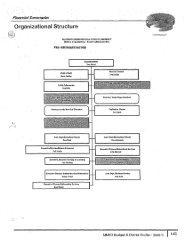
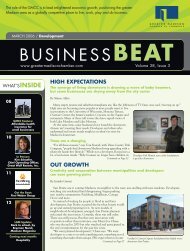
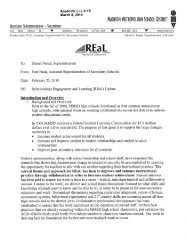
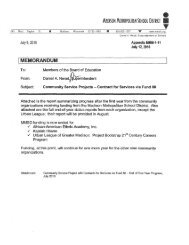
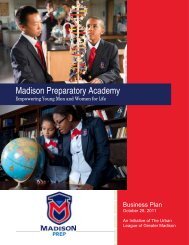
![by Shaina Wright [PDF] Ralph Waldo Emerson Prize 2006 - School ...](https://img.yumpu.com/26083584/1/174x260/by-shaina-wright-pdf-ralph-waldo-emerson-prize-2006-school-.jpg?quality=85)
